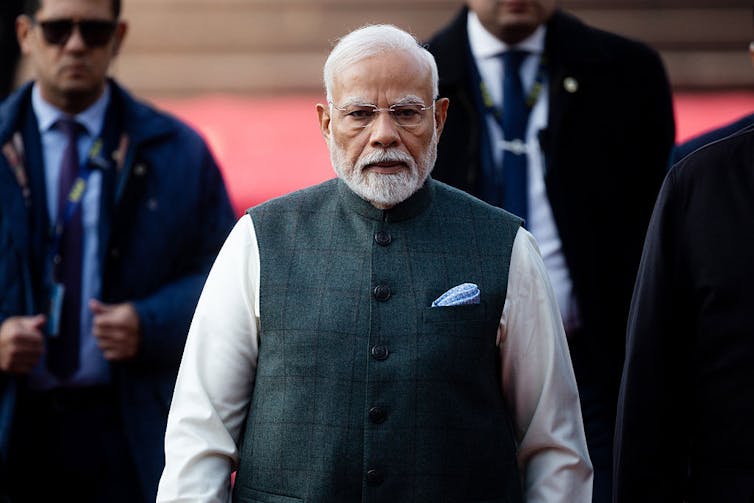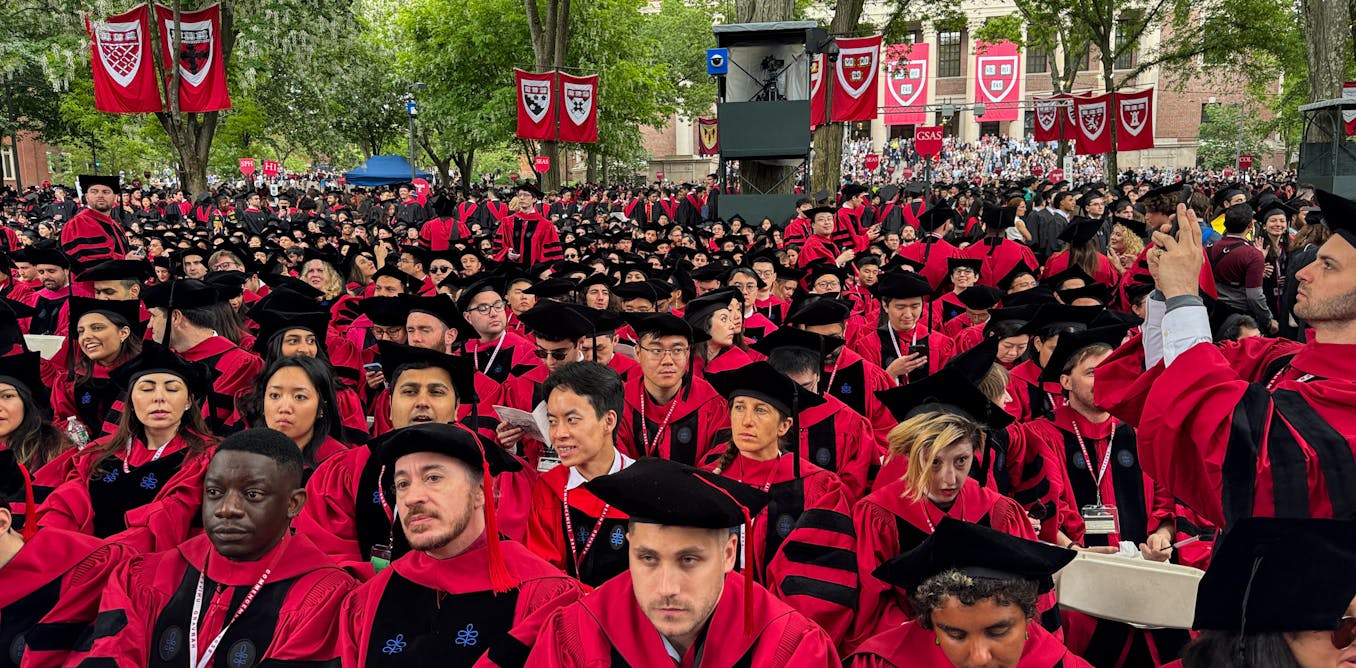Harvard University is under siege by the Trump administration – and the world is watching. But this case isn’t just an American issue.
It’s part of a global trend: universities cast as enemies and institutions in need of reform. Populist, right-wing governments are blaming universities for tearing at the fabric of nations.
These attacks are part of a broader strategy known as affective nationalism. It occurs when leaders use emotions, not just ideas, to build national identity. Feelings such as fear, pride, nostalgia and resentment are deployed to create a story about who belongs, who doesn’t and who’s to blame.
As scholars who study nationalism, emotion and higher education, we explore the emotional politics behind these attacks.
Pierre Crom/Getty Images News
Global backlash
Much of President Donald Trump’s vision and rhetoric is inspired by Hungary, where Prime Minister Viktor Orbán has waged a culture war on higher education for over a decade, banning gender studies and reshaping university governance. Orbán’s attacks on Central European University expose his hostility to academic freedom, critical thinking and diversity. All are viewed as threats to his nationalist “illiberal democracy.”
Trump followed Orbán’s playbook. On May 22, 2025, his administration declared that Harvard could no longer enroll foreign students. A U.S. Department of Homeland Security statement claimed that university leaders “created an unsafe campus environment by permitting anti-American, pro-terrorist agitators.” The statement suggested that many of the so-called agitators were foreign students.
Similarly, in India, students at Jawaharlal Nehru University were labeled “anti-national” for protesting the Citizenship Amendment Act, which provides fast-track citizenship to non-Muslim refugees. The students argued that it marginalizes Muslims. Since 2016, the Modi government has increasingly used “anti-national” and sedition charges to silence student and academic dissent.
These labels – “elite,” “foreign” or “anti-national” – are not neutral. They fuel fear, resentment and powerful narratives that frame universities as threats. Harvard, Central European University and Jawaharlal Nehru University have become symbols of broader national anxieties around identity and belonging.
British-Australian feminist scholar Sara Ahmed’s work on the sticky nature of emotions helps reveal the two emotions that often appear in attacks on universities: nostalgia and resentment.

Chip Somodevilla/Getty Images News
Glorifying the nation’s past
Nostalgia is a longing for a better past.
Consider Trump’s “Make American Great Again” slogan. It implies the nation was once great, has declined and must reclaim its former glory. That’s a powerful emotional story. Nationalism often works this way – by telling a tale of a lost golden age and a future that must be saved.
For that reason, nostalgia is central to populist attacks on universities and institutional reform. U.S. Secretary of Education Linda McMahon, for example, evoked Harvard’s symbolic past as part of the American Dream, arguing it has lost its way and “put its reputation in serious jeopardy.”
In India, Modi’s government rejects Western influence, while using nostalgia to revive a Hindu past in higher education. The Modi government promotes national pride on campuses by glorifying military heroes and installing symbolic figures – such as the statue of Swami Vivekananda, a Hindu monk and philosopher, at Jawaharlal Nehru University – to shape student identity and loyalty.
In Hungary, Orbán mobilizes a glorified Christian past to challenge discourses on diversity, inclusion, critical inquiry and academic freedom in higher education. A 2021 bill tasks universities with defending the nation and preserving its intellectual and cultural heritage.

Tomas Cuesta/Getty Images News
Enemies of the nation
Resentment is a powerful emotion often used by states that see themselves as defenders of national unity and values. When Harvard resisted Trump’s reforms, the president framed the university’s stance in a Truth Social post as a betrayal to the nation, denouncing it as “terrorist inspired/supporting ‘sickness.’” Meanwhile, the Department of Education issued a statement that accused the university of a “troubling entitlement mindset.”
Similarly, in India, the Modi government has increasingly framed public universities – especially those with critical voices – as “anti-national” spaces. By casting critical voices as enemies within, the state turns resentment into a political weapon to justify the erosion of academic freedom.
In Hungary, the Orbán government mobilized resentment to portray universities and academics as disloyal elites working against the nation. One example of Hungary’s war on universities is the 2018 ban on gender studies, justified by the Orbán government as rejecting “socially constructed genders” in favor of “biological sexes.” This move reflects how the government uses resentment to assert ideological control over academic institutions.

Hindustan Times
Emotional battlegrounds?
Universities, especially elite ones such as Harvard and Jawaharlal Nehru University, carry deep symbolic weight. People care because of what the institutions represent.
Harvard, with its elite status, has long been a symbol of academic authority. But more recently, it has been cast as a defender of liberal higher education – making it a Trump administration target.
Jawaharlal Nehru University in India holds similar symbolic weight. It’s historically associated with producing the country’s social elites and is seen, especially in mainstream media, as left-leaning, making it a lightning rod in India’s polarized political landscape.
In Hungary, the Orbán government viewed Central European University as a danger because it threatened the government’s Christian-nationalist vision of the nation-state.
Universities are under attack not just for what they teach and research, but for what – and who – they represent. These are not just ideological disputes; they are emotional struggles over identity, belonging and public trust.

The post “Leaders in India, Hungary and the US are using appeals to nostalgia and nationalism to attack higher education” by Riyad A. Shahjahan, Professor of Higher, Adult and Life Long Education, Michigan State University was published on 07/18/2025 by theconversation.com






































Leave a Reply